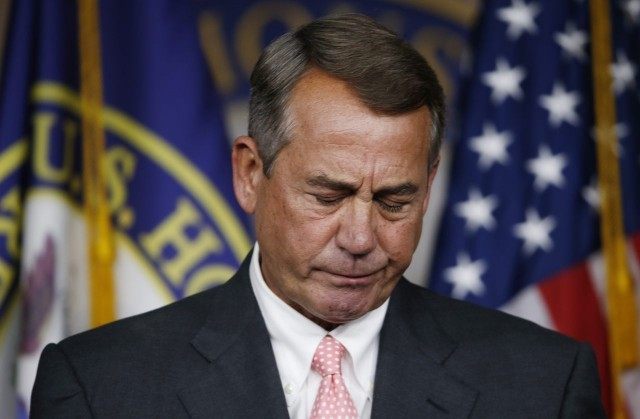The House of Representatives is a hot mess coming off the announcement that House Speaker John Boehner will resign his position—and from Congress—at the end of the month.
A little more than a week ago, Boehner announced he’ll step down on Oct. 30. At first, it seemed as if his heir apparent House Majority Leader Kevin McCarthy would easily ascend into the speakership and that House Majority Whip Steve Scalise would easily replace McCarthy, and Chief Deputy Whip Rep. Patrick McHenry (R-NC) would easily ascend into the Whip’s role. Now, one of that seems easy or likely as the growing conservative wing of the conference—emboldened by Boehner’s resignation—is demanding a series of structural reforms to the way business in done in Congress rather than just a reshuffling of the deck in leadership post-Boehner.
“Speaker John Boehner is considering delaying the internal election for House majority leader and majority whip, leaving only the party vote for speaker to be decided on Thursday, according to multiple Republican sources with direct knowledge of the deliberations,” Politico’s Jake Sherman, John Bresnahan and Lauren French report.
This stems from Reps. Mick Mulvaney (R-SC) and Jim Renacci (R-OH)—a conservative and a moderate, respectively—circulating a letter around the House GOP conference that Politico notes requests a delay in elections for the Majority Leader and Majority Whip positions.
“There is also widespread interest in considering a change in internal party rules that would force candidates to resign chairmanships and leadership slots to run for new office,” Politico wrote, adding that there is “serious unrest in the House Republican Conference, and delaying the elections might give more time for the mood to settle, according to sources involved in the planning.”
The House GOP conference is set to vote this week—on Thursday—behind closed doors for the Speaker position, and the original plan was that the other two positions would also be elected that day.
“All leadership elections remain on Thursday,” Kevin Smith, Boehner’s spokesman, told Politico.
But under pressure from all sides of the conference, that may change.
“There is a broad interest in discussing rule changes before we discuss leadership changes,” Mulvaney told Politico. “Conservatives and centrists alike are interested in changing the structure of the way the conference is run and the way the House is operated. If we move immediately into leadership elections, we may not have time to have the debate.”
Politico notes that Boehner has yet to agree to any changes, but “he will discuss it with fellow leaders Monday and Tuesday.”
Despite the fact Boehner is technically resigning at the end of the month, he is still intricately involved in this process of leaving the House with a successor on his way out the door. He’s also dealing with not just funding the government—which he successfully completed last week—but likely an increase in the debt ceiling, and with framing the fights his eventual successor will need to deal with right away when that person takes office.
And complicating matters is the fact that McCarthy has slipped up on his way out the gate. In a recent interview with Fox News’ Sean Hannity, he implied that the House Benghazi Select Committee was designed to attack former Secretary of State Hillary Clinton’s presidential campaign poll numbers. That’s opened the door to challengers to McCarthy emerging, including Reps. Daniel Webster (R-FL)—who ran against Boehner at the beginning of this Congress nearly successfully—and Jason Chaffetz (R-UT), the chairman of the House Committee on Oversight and Government Reform.
Meanwhile, Scalise—and challenger House Budget Committee chairman Rep. Tom Price (R-GA)—can’t wrap up the race for House Majority Leader, and McHenry is having difficulty locking up enough support for House Majority Whip.
Rep. Peter Roskam (R-IL), a former member of leadership who is viewed by many as a plausible alternative to McCarthy, has pushed for the rules changes in the conference that Politico is now reporting on.
“It’s clear our members believe that we need a plan, not a person, to heal the fractures within our majority,” Roskam told Breitbart News a little over a week ago. “I’m glad we’ll now have a chance for an open dialogue that will help us start to unify behind the conservative solutions the American people deserve.”
The picture of what will happen next is likely to become much clearer after McCarthy, Webster and presumably now Chaffetz meet with as many as 80 conservatives across four separate groups—the House Freedom Caucus, the Conservative Opportunity Society, the House Tea Party Caucus, and the House Liberty Caucus—on Tuesday evening from 7:30 p.m. to 9 p.m. in a members-only, behind-closed-door vetting session.

COMMENTS
Please let us know if you're having issues with commenting.